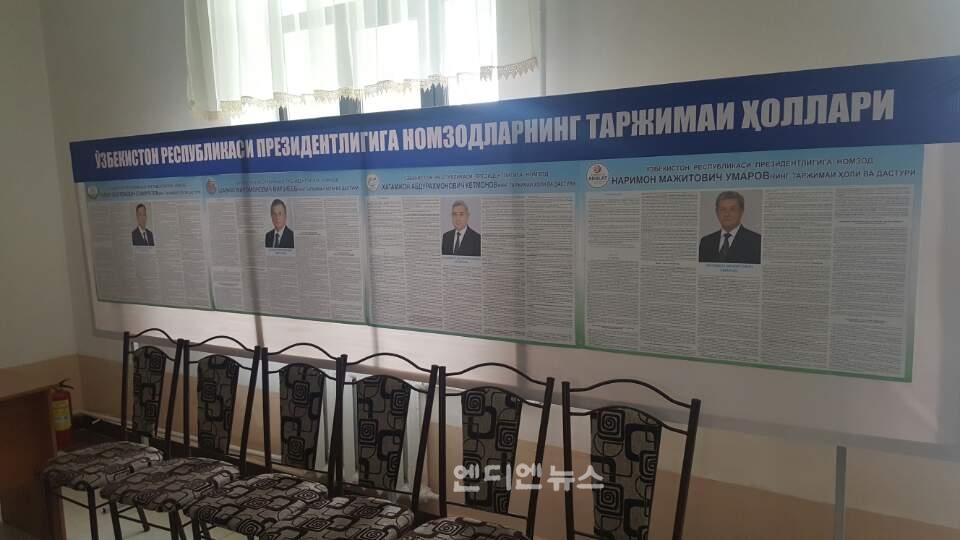The presidential elections in Uzbekistan scheduled for December 4 constitute an important
socio-political event in the life of the nation.
Everything has been created for high organizational, legal and logistical preparedness for
the political event and its open, transparent and fair conduct in full compliance with the
democratic principles enshrined in the national electoral legislation.
International observers were informed about delivery of legislation in the years of
independence regulating the presidential elections process. It is by and large made up of
the laws on the Elections of President of the Republic of Uzbekistan, on Guarantees of
Electoral Rights of Citizens, on the Central Election Commission of
the Republic of Uzbekistan.
 |
Adopted in the field, the normative-legal acts are aimed at the unconditional
observance of the electoral rights of citizens on the basis of the principles of justice,
transparency, openness and publicity, at delivering an environment conducive
for citizens to participate freely in the polls, at providing – in the period of
electoral campaigning – broad and equal opportunities for presidential hopefuls.
It was noted during the briefing that all the events within the electoral season
are taking place in open and transparent manner, in strict accordance with the law.
It should be emphasized that with purposes of organizing the upcoming
elections in full compliance with democratic principles, open and
transparent, at a high level, comprehensive efforts are in full swing. In
particular, 9.383 polling stations, wh ere voting will take place,
have been readied for the event. Election commissions at all levels are
undertaking extensive works to secure the electoral rights of citizens.
Together with a number of governmental and social organizations, the Central
Election Commission has held training seminars in three tiers encompassing
the national, provincial and district levels in order to raise the legal
knowledge and practical skills of the membersof precinct election commissions.
Polling stations have been delivered half a million copies
of law literature and normative acts. In order to create amenities for
people with disabilities, ramps have been installed at polling stations,
and one of the voting cabins is equipped for that category of citizens.
Brochures in Braille about the elections have been published for
blind people. For the first time special ballot sheets have been issued
for them. Every polling station, including those set up abroad, are
delivered ballots in sufficient quantities.
Also for the first time in the history of the national electoral practice,
a program of measures to further uplift the law culture of voters in the run-up to the presidential
elections has been worked out and approved by the CEC.
Events organized in the framework of this program covered the general
population, in particular the youth and women, including housewives.
During this period, about 104 thousand events, roundtable discussions,
seminars have been organized in this area together with civil society
institutions on the basis of social partnership.
After the registration of presidential candidates by the Central Election
Commission,that is, on 28 October, electoral campaigning started.
Nominees for the highest post in the country began campaigning in order
to inform the public about their policy programs that
outline ideas and opinions, proposals and initiatives in the socio-political
and socio-economic development of the nation.
Presidential candidates and their authorized representatives held about
1,000 meetings with voters in all districts.
While setting off the electoral season, the Central Election Commission
invited a number of prestigious international organizations and foreign
experts to monitor the electoral process.To date, the election
campaign for presidential elections is observed by missions of the
OSCE Officefor Democratic Institutions and Human Rights, the
Commonwealth of Independent States, the Shanghai Cooperation
Organization, the World Association of Electoral Bodies, the
Organization of Islamic Cooperation. In general, along with representatives
of these organizations, the elections are expected to be monitored by
more than 500 state and public figures, representatives of parliaments
and electoral bodies, law scholars, political scientists from nearly fifty
countries. In addition, 37,500 people from the political parties will be
involved in the electoral process as observers.
In order to provide for openness and transparency of the presidential
ballot, all the conditions are created for media to carry out their activities
effectively. In this, a major role is played by the Republican Press
Center for the coverage of the presidential elections and the press
centers of district election commissions. To date, they have organized
approximately 140 press conferences and briefings on important stages
of the electoral season.
Election commissions have accredited about 1,400 journalists. The
polls in our country have attracted a great attention of foreign journalists.
In particular, the elections will be covered by more than 100 representatives
of foreign media.
The Central Election Commission is to inform the public about the
voting process on December 4 via online briefings organized in the
Republican Press Center for covering the elections of President of the
Republic of Uzbekistan.
Editor-in-chief Shin Hyun-doo from Tashkent, Uzbekistan

